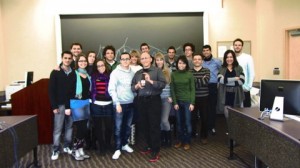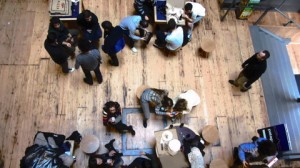First week in Portland, OR #Sustainability
After 15 hours of travel we landed safe in Portland, OR with quite a jet lag – the day had just +9 hours. On Sunday we had time to explore the city. Honestly I didn’t really liked first. It was cold, rainy, nobody on the street, everything closed. And why it should be the greenest city in the US? I don’t know what I expected, but this city was everything else than green for me. Luckily I know it better now and each day I liked it more – with all its cosy restaurants, organic food and great products it offers. Sometimes it just needs some more time and good food ![]()
Monday was the first time we met Howard, our coordinator from Portland University and started with our 2-weeks program. During the first week we visited Columbia Sportswear, Portland Purple Water and had a delicious sustainable pizza at Hot Lips Pizza in the Ecotrust building. On campus we had the pleasure to enjoy oral presentations from Bonneville Environmental Foundation, New Buildings Institute, Natural Step and Portland General Electric about the institutions and its sustainable visions. It is very interesting for me to get to know insights into sustainable businesses practice – how to actually break down this impalpable word into manageable goals and to see different approaches.
What really kept me busy during this week was the question we raised in one class on sustainability about the motivation of companies to decide to be “green”. Some are changing and see an competitive advantage in it. I would call this sustainable businesses rather “responsible”, because they take responsibility for the impacts their business activities causes. But why are there still many businesses which do not move? Is it lack of awareness, lack of knowledge or the investments they expect to make? What else do they need to take responsibility and create an action plan to change business practice?
The necessity to move is there and I can see the direct link between the environment, the businesses and the society. Briefly the agriculture depends on a functioning nature and most industries are based or dependent on agriculture. And the industry produces goods to satisfy the needs of the consumers. Hence, if businesses don’t care about the environment and social sustainability they can be threatened from both sides. My conclusion is that taking environmental and social considerations into account is simply risk management! Let me find out more about it the coming week!






.png)
].gif)
.png)
].png)
].png)
].png)
.png)
].png)
.png)
